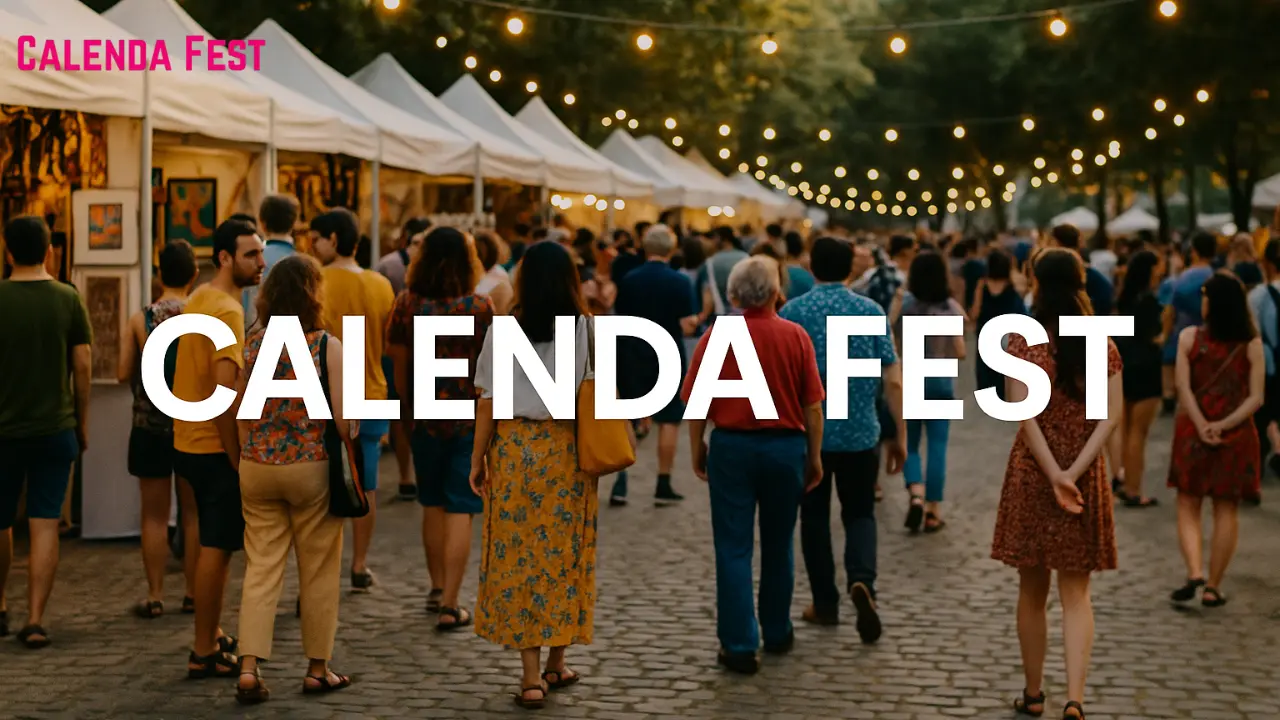Introduction to Calenda Fest
Calenda Fest is a fascinating cultural celebration that has drawn attention for its unique blend of history, tradition, and modern expression. Rooted in deep historical practices, the term “Calenda” carries meanings tied to beginnings, cycles, and the start of something new. Over time, this foundation has evolved into what is known today as Calenda Fest, an event that merges community, culture, and creativity. For many, the festival is more than a gathering; it is an exploration of heritage and a reminder of how ancient customs can influence present-day celebrations.
The essence of Calenda Fest lies in its ability to bridge the gap between past and present. While its roots are linked with ancient calendars, rituals, and community gatherings, the modern celebration has grown into a multi-dimensional event that draws people together for art, music, performances, and cultural exchange. Visitors often describe the festival as an immersive experience that invites them to reflect on tradition while enjoying the excitement of contemporary festivities.
The Origins of Calenda Fest
The name “Calenda” originates from the Latin word Kalendae, which referred to the first day of every month in the Roman calendar. This day held symbolic importance as a marker of new beginnings and cycles. Over centuries, this idea spread into various traditions and communities, taking on cultural and religious significance in different forms. Calenda Fest, therefore, embodies the celebration of renewal, marking the intersection of history and cultural memory.
In some traditions, Kalenda was also associated with festivities during the transition of seasons, often celebrated with rituals, gatherings, and music. This historical context gives Calenda Fest a deeper meaning, as it becomes not just a modern-day festival but a symbolic event tied to ancient rhythms of life. By reviving the name and concept, communities create a platform where history is honored while adapting to contemporary forms of expression.
Cultural Significance of Calenda Fest
Calenda Fest stands out as more than an entertainment event; it represents cultural preservation and identity. Festivals like these serve as vital reminders of heritage, allowing communities to reconnect with traditions that might otherwise fade into history. By naming the festival “Calenda,” organizers emphasize continuity with the past, while ensuring that new generations can participate in meaningful cultural experiences.
The cultural richness of Calenda Fest is reflected in the diversity of its offerings. Depending on where it is celebrated, the festival may include traditional dance, folk music, storytelling, or even symbolic rituals that recall its historical roots. Each activity not only entertains but also educates, reminding participants that culture is a living, evolving force. Through these celebrations, communities reinforce values of unity, creativity, and respect for tradition.
Music and Dance at Calenda Fest
One of the highlights of Calenda Fest is the vibrant music and dance that bring energy to the celebration. Historically, festivals tied to the “Calenda” tradition often involved singing and rhythmic movements that symbolized joy, renewal, and connection to nature. In modern celebrations, this has expanded into concerts, live performances, and even fusion shows that blend traditional sounds with contemporary genres.
Dance plays a central role as well, serving as a universal language that connects generations and cultures. Folk groups often showcase traditional steps that tell stories of heritage, while modern performers reinterpret these dances to make them relevant to today’s audience. This balance between preservation and innovation ensures that the cultural heartbeat of Calenda Fest remains strong.
Art and Creativity at Calenda Fest
Beyond music and dance, Calenda Fest has become a hub for artistic expression. Artists use the festival as a platform to display visual art, sculptures, and installations that reflect the themes of renewal, identity, and community. These creative works add depth to the celebration, allowing attendees to engage not only with performance but also with visual storytelling.
Workshops and collaborative projects are another significant part of the artistic side of Calenda Fest. Local artisans and creators often involve visitors in hands-on activities, from traditional crafts to modern design. This interactive element transforms the festival into an educational experience, allowing people to take home not just memories but also skills and knowledge.
Food and Culinary Traditions
No festival is complete without food, and Calenda Fest is no exception. Culinary traditions play an essential role, offering both local delicacies and international flavors that reflect the diverse community of attendees. Traditional foods often tie back to the festival’s origins, with symbolic dishes that represent abundance, prosperity, and new beginnings.
Street food stalls, pop-up restaurants, and culinary demonstrations make the festival a paradise for food lovers. Visitors can enjoy a blend of historic recipes passed down through generations alongside modern interpretations crafted by innovative chefs. This fusion of old and new flavors mirrors the festival’s broader theme of connecting heritage with contemporary life.
Community and Togetherness
At its core, Calenda Fest is about people coming together. The festival fosters a sense of belonging that transcends cultural and generational boundaries. Families, friends, and strangers gather to share in the joy of the event, reinforcing the values of unity and mutual respect. In a world often marked by division, festivals like Calenda Fest remind us of the importance of human connection.
Volunteerism and collaboration are essential to the success of the festival. Local organizations, artists, and community groups often contribute their time and resources to ensure the event runs smoothly. This collective effort highlights the spirit of togetherness that defines the celebration, turning it into a truly communal achievement.
The Modern Evolution of Calenda Fest
While Calenda Fest honors its historical roots, it has also adapted to modern times. In today’s globalized world, festivals must resonate with diverse audiences while maintaining authenticity. Organizers achieve this balance by incorporating contemporary elements like digital art, interactive experiences, and sustainable practices. These innovations ensure that the festival remains relevant and appealing to new generations.
Technology has also expanded the reach of Calenda Fest. Social media platforms, live streaming, and digital promotions allow people worldwide to engage with the festival, even if they cannot attend in person. This global visibility strengthens its impact, turning it from a local celebration into a cultural phenomenon with international recognition.
Economic and Tourism Impact
Calenda Fest also contributes significantly to local economies. By attracting visitors from near and far, the festival generates revenue for small businesses, hotels, restaurants, and artisans. The tourism boost not only benefits individuals but also strengthens the overall economy of the region where it is held. Festivals like these often become annual highlights on tourism calendars, drawing consistent crowds.
In addition, Calenda Fest provides opportunities for local talent to gain exposure. Musicians, artists, chefs, and entrepreneurs use the festival as a platform to showcase their work, often reaching audiences far larger than they could otherwise. This economic ripple effect underscores the practical importance of cultural celebrations in addition to their symbolic value.
Preserving Traditions for the Future
One of the most vital aspects of Calenda Fest is its role in preserving traditions for future generations. Without festivals like this, many cultural practices risk being forgotten in the face of modernization and globalization. By celebrating traditions in a modern format, Calenda Fest ensures that young people remain connected to their roots.
Educational programs, storytelling sessions, and cultural exhibitions help bridge the gap between generations. Elders share wisdom and history, while youth bring fresh energy and creativity. This intergenerational exchange keeps the spirit of Calenda Fest alive, ensuring that it continues to evolve while staying true to its foundation.
Conclusion
Calenda Fest is a celebration that embodies renewal, community, creativity, and heritage. From its origins in the ancient concept of the Kalendae to its modern expression as a vibrant festival, it has grown into an event that unites people through music, dance, art, food, and togetherness. Its cultural, social, and economic impacts make it a cornerstone of community life and a beacon of cultural preservation.
As the festival continues to evolve, it remains a shining example of how history and modernity can blend seamlessly. For attendees, Calenda Fest offers not just entertainment but also an opportunity to connect with deeper traditions, reflect on the meaning of beginnings, and celebrate the richness of cultural heritage in today’s world.
Frequently Asked Questions (FAQs)
1. What is Calenda Fest?
Calenda Fest is a cultural festival rooted in the historical concept of the Kalendae, or the first day of the Roman month. It has evolved into a modern celebration that combines heritage, art, music, food, and community.
2. Why is it called Calenda Fest?
The word “Calenda” comes from the Latin Kalendae, meaning the beginning of the month. The festival symbolizes renewal, fresh starts, and cycles of life, which is why the name carries deep significance.
3. What activities can visitors enjoy at Calenda Fest?
Visitors can experience traditional and modern music, dance performances, art exhibitions, food stalls, workshops, and cultural rituals that celebrate both history and creativity.
4. How does Calenda Fest impact local communities?
It strengthens community bonds, boosts local economies through tourism, and provides a platform for artists, musicians, and entrepreneurs to showcase their talents.
5. Why is Calenda Fest important for cultural preservation?
By reviving traditions in a contemporary format, the festival ensures that cultural practices are passed down to new generations while remaining relevant in today’s world.




